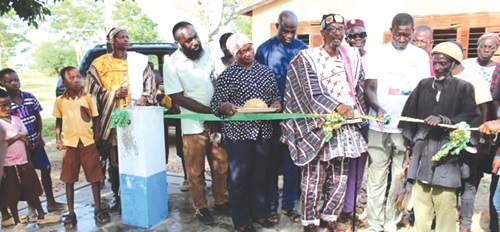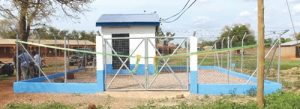GH¢2.5m Bongo Water Supply System expansion completed

WaterAid Ghana has completed a GH¢2.5 million expansion of the Bongo Water Supply System, as part of efforts to provide access to safe water in the Bongo District in the Upper East Region.
The project, which has boosted daily water production from 20,000 litres to 116,000 litres, was executed in partnership with the Community Water and Sanitation Agency (CWSA), with funding support from the Zochonis Charitable Trust.
The total project cost stood at GH¢2,553,145.33, and is expected to bring relief to users of the facility.
The newly completed project includes the mechanisation of two existing boreholes, raising daily production from 20,000 litres to 116,000 litres. It also involved the construction of two pump houses, four public standpipes, one institutional standpipe, and the laying of nine kilometres of distribution pipelines.
It formed part of a broader strategy to address both water scarcity and the alarming levels of fluoride contamination in the district’s groundwater.
Critical step
At the ceremony, the Country Director for WaterAid Ghana, Ewurabena Yanyi-Akofur, described the project as a critical step forward in ensuring sustainable access to clean water, but stressed that much more remained to be done.

The new water supply system
“Bongo is a very unique district because it is challenged with the issue of fluoride. Out of the four boreholes previously in use, three are now compromised, even though that was not the case at the time of construction,” she said.
She called on the government, donors and key partners to invest further in alternative water sources, including surface water, which she said was not affected by fluoride.
Ms Yanyi-Akofur said: “It would require huge investments that WaterAid cannot do alone but in partnership with government and other donors. We believe the people of Bongo deserve clean water every day.”
“Bongo town alone needs about 500 cubic metres of water per day but the project provides only 150 cubic metres, meaning additional 350 cubic metres of water will be needed to increase water supply.”
Fluoride contamination
The acting Upper East Regional Director of the Community Water and Sanitation Agency (CWSA), Emmanuel Oppong, explained that the project was executed in response to two urgent issues: limited potable water supply and unsafe fluoride levels in groundwater sources.
“Out of 11 boreholes we sampled, only seven met the acceptable fluoride threshold of less than 1.5mg/l.
Two of these, with reliable yields of 4.8 and 6.0 cubic metres per hour, were selected and mechanised,” he explained.
Mr Oppong commended WaterAid Ghana and its partners for their funding and technical input towards providing access to safe drinking water in the area.
The Paramount Chief of the Bongo Traditional Area, Naba Baba Salifu Atamale Lemyaarum, expressed gratitude to WaterAid Ghana and its partners for their continued efforts in providing potable water for the area.
He pledged to rally his people to properly take care of the water system and regularly maintain it to serve generations as intended.



